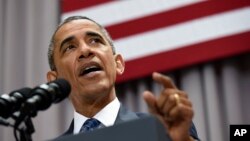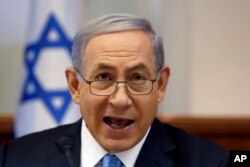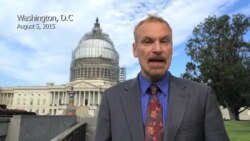President Barack Obama vigorously defended the international accord to restrain Iran's nuclear program by saying it "cuts off all of Iran's pathways to a bomb."
"It is a very good deal," Obama said Wednesday in a nearly hour-long address at American University in Washington.
He said if the pact is implemented, it 'would be good for Iran. It would be good for the United States. It would be good for a region that has known too much conflict. It would be good for the world."
The president stressed that the accord builds on an American tradition of “strong, principled diplomacy” with adversaries.
Drawing a comparison to another controversial presidential foreign-affairs speech at American University a half-century ago, Obama argued the nation is on the brink of another momentous choice.
Diplomacy
He recalled how President John F. Kennedy called for diplomatic negotiations with the former Soviet Union to curb nuclear tests, in the face of fierce opposition from those who wanted U.S. military action.
Obama said the approach the United States took – keeping its military strong, but taking no aggressive action, in favor of patient diplomacy – eventually resulted in several international treaties to limit nuclear activity.
Watch: Obama States Case for Deal
He urged Americans to call skeptical lawmakers in the U.S. Congress to urge them to approve the pact when they vote on it next month.
The deal would bar Tehran from building a nuclear weapon in exchange for lifting United Nations and Western sanctions that have hobbled Iran's economy. Opponents say provisions to verify that Iran is complying with the accord are too weak.
Obama rebuffed such criticism, saying, "This is the strongest nonproliferation ever negotiated."
He said that if Congress rejects the deal, it "would accelerate" the possibility that Iran could build a bomb because monitoring of Tehran's activities would be limited.
Obama said many of the criticisms, which are made widely by Republicans in Congress, can be attributed to "knee-jerk partisanship" and spread false fears about the deal, which lawmakers are set to vote on next month.
"I know it's easy to play on people's fears, to magnify threats... but none of these arguments hold up," he said.
Reminiscent of Iraq
Obama said the debate in Congress over the Iran pact is "the most consequential" decision facing the country since the United States moved to invade Iraq.
Congress approved former President George W. Bush's invasion plan in 2002, based on what turned out to be faulty intelligence – the mistaken belief that Baghdad possessed a powerful cache of weapons of mass destruction ready for use.
He said some of the Iraq war's strongest supporters a decade ago are now some of the most vocal opponents of the Iran deal. He said they should give the internationally negotiated Iran deal a chance to be implemented.
The U.S. Congress is in the midst of a 60-day window to consider the pact, set to vote in September whether to accept or reject the deal.
Obama has promised to veto a rejection, which would then force both the Senate and House to muster a two-thirds majority to override the veto.
Also in attendance at the speech Wednesday were members representing the P5+1 group that was involved in the nuclear negotiations: British Ambassador Sir Peter Westmacott, Russian Ambassador Sergey Kislyak, Chinese Ambassador Cui Tiankai, French Charge d’Affaires Frederic Dore, German Charge d’Affaires Philipp Ackermann and EU Charge d’Affaires Antonio De Lecea.
Israeli opposition
Israel vigorously opposes the Iran deal.
Obama said every country that has commented on the Iran nuclear deal has supported it -- except for Israel, saying, “No one can blame Israel for having a deep skepticism for any deal involving Iran.”
He said he doesn't doubt the sincerity of Prime Minister Benjamin Netanyahu, one of the fiercest opponents of the agreement. But in a blunt assessment of Netanyahu's views, Obama said, "I believe he is wrong."
While the U.S. has made it clear it is willing to discuss ways to meet Israel’s security needs, Obama said, it cannot abandon the Iran nuclear deal because it might create friction with Tel Aviv.
At a White House meeting Tuesday, Obama told Jewish leaders that new Mideast clashes could break out if Congress does not approve the accord brokered by the U.S. and five other world powers because there would be no restraints on Tehran.
In a separate appeal to American Jews via a webcast, Prime Minister Netanyahu said Iran's financial windfall from sanctions relief will give it new funding to foment destabilizing regional conflicts.
Obama's address comes as new polls show a dip in public support for the deal, and broad skepticism among Americans about Iran’s intentions and willingness to comply with the pact.
American voters oppose the Iran deal 2-to-1, with only lukewarm support from Democrats and overwhelming opposition for Republicans and independent voters, according to a Quinnipiac University national poll released Monday.
Lobbying effort
Obama and other high-ranking administration officials have launched a massive effort to convince skeptical lawmakers to approve the deal reached between Iran and six nations -- the United States, Britain, Germany, France, Russia and China.
Four U.S. Democratic senators -- Tim Kaine, Barbara Boxer, Chris Murphy and Bill Nelson -- as well as Democratic Representative Mike Thompson have publicly backed the president this week.
But Steve Israel, Nita Lowey and Ted Deutch, three Jewish House Democrats, all announced their opposition.
Differing assessments of the merits of the accord with Iran, and the fallout if the United States walked away from it, were given by former high-ranking U.S. diplomats and other former officials during testimony Tuesday before Senate committees.
“I don’t believe that congressional defeat of the president’s proposal would lead inevitably to war,” said former undersecretary of state for political affairs Nicholas Burns, who served during the George W. Bush administration. “But neither do I believe that the nuclear deal leads inevitably to an Iranian nuclear weapon, as some of the critics are suggesting.”
Some material for this report came from AP.
WATCH: Michael Bowman reports from Capitol Hill








